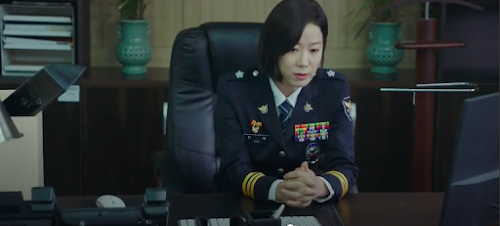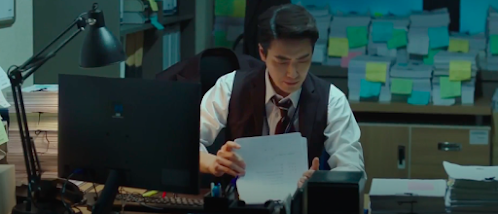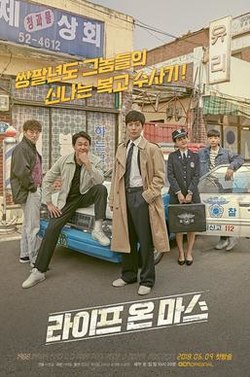I was amused and somewhat gratified to read Choi Won-young's latest character mouth the very same lines that I had written in my previous post. All the predictably good stuff about "just because you can doesn't mean you should", "this is an intrusion into the realm of the gods" etc etc. It's clear that the show is presenting him as an antagonist to the prevailing Alice narrative although it's unclear how much of that hostility plays out in actual violence. Seok O-won, the head of the Kuiper Institute of Advanced Sciences, believes that time travel is possible. A charismatic man of science to boot. He is the first one from 2020 to state that unequivocally but he also styles himself as a critic of it. It's a dangerous proposition and it's not hard to see from recent events that he has a point or two. Science is a tool, neither good or evil in and of itself but in the wrong hands, it can go very very badly not just for the person who uses it but for others around them.
 |
|
My fascination with Alice lies mainly with its philosophical underpinnings and explorations. The big ideas of life, that sort of thing. I don't think it does anything spectacularly different from a lot of sci-fi and perhaps visually some aspects of it might seem a bit cheesy. But the storytelling is very good and what it tries to do, it does well. Besides I'm always a sucker for a decent police procedural even if it takes a back seat to mind-bending sci-fi.
People are getting murdered and not all of them are mysteries. The audience is privy to the ins and outs behind the bloodlust. The ones that remain unsolved up to this point and the ones whose motives are known. Both feed into the overarching moral dilemmas related to using time travel supposedly in the betterment of humanity's lot. The debate is this: Just because we can use time travel to do good (in varying degrees) there are costs... and trade-offs. Do the gains outweigh the losses? Are the gains offset by the losses? It's a crucial principle that should inform all manner of public policy on all levels. This is a point well-made during this season of Covid-19. To put it in medical terms, "Is the cure worse than the disease?"
When the head honcho of Alice, Ki Cheol-an says to a defensive Eun-soo's mother that by killing her 2020 self, she has now left her beloved Eun-soo without a mother. The show allows the full weight of that statement to land on the grieving mother. A gentle rebuke of her blind selfishness. Not too many will quibble with the fact that she loved her daughter and she was still grieving in 2050 that her daughter had died at 17 because of a single event. She blames her past self for being lax and complacent and thinks she would do a better job equipped with foreknowledge. But as the scenario plays out, the murder is inevitably discovered because let's face it the lady is hardly a criminal genius. 2050 mother is now on the run from 2020 law enforcement and needs rescuing. On top of that 2020 Eun-soo is now motherless and Dad is wifeles and grief-stricken. The future for them might arguably be bleaker than before. In a fit of emotional rage with no one to hold her back, Eun-soo's mother commits an irreversible crime.
The incident also highlights the difficulty of prediction. It's almost impossible for us mere mortals to know what will happen. It is possible to look at history and make a few good, educated guesses about the big picture of where the world is headed. That's certainly not beyond the pale. But on an individual level, it's much harder. How many times have we said... or heard people say, "Never in my dreams did I imagine I would be doing XYZ" or "If you had told me when I was 20 that I would be in this position now blah blah blah"? If only I had $10 for every time I've heard it. Whether the outcomes are net positive or negative one can't be sure that while one is in a middle of living life if one's life is a tragedy.

With regards to Eun-soo's mother she was so fixated with the one event... the death of her daughter... that she forgot about the good times that they shared. In 2050 she was trapped in the past that was 2030. Revisiting the past could have been helpful in the grieving process but it was more about course correction which led to the overreach and then murder. In the end she swapped one form of grief for another.
The other so-called related moral lesson for all concerned is about how humans deal with suffering and grief. Again, universally and perennially topical. Again, this has long been the subject of science fiction. The film Equilibrium, a favourite after the manner of Fahrenheit 451 springs to mind. A stoic utopia "no place"... or more appropriately dystopia created with the underlying assumption that eliminating emotions is the only way to control human beings and gain a peaceful society. In Serenity, a similar project was also undertaken by the government to turn everyone docile except for the fact that it led to serious, deadly side effects to creating that brave new world.
To me history proves that our world is a fallen one filled with flawed, broken human beings. Death is a reality. History is replete with examples of how human beings make the same mistakes over and over again. Much suffering is tied to that. In some ways progress has been made over time but it doesn't take much for regression to barbarism to emerge. Lord of the Flies is a sober reminder that without constraints... legal, social and personal... things fall apart fast. Good intentions can end horribly badly. Once again, I refer to Eun-soo's mother. She's the anthropomorphic metaphor here of those who grieve and can't move on. Perhaps there is even a certain perceived nobility in that... remembering, never forgetting. Like what Jin-gyeom says to his adoptive father and mentor, Go Hyeon-seok. You don't forget family. I doubt it's a statement that anyone who has lost family would ever disagree. But there comes a time of moving on which is not the same as forgetting. It means concentrating on living out the rest of one's life without the one that is lost. Overcoming it is a part of life. We all do it in different ways. At my mother's funeral we talked about her, we cried, we laughed and we hugged each other. It was very hard the first year but I credit my children for "compelling" me to focus on the moment, focus on what I had rather than what I didn't. The belief in the afterlife, the hope that she was no longer suffering and that we'll meet again one day... all of that helped me to "move on" as well.
It's crucial to learn the right lessons from grief and loss. That was also the message of It's Okay Not to be Okay. Suffering can make or break a person. When someone grows stronger from it, resilience is the fruit.
Time travel seems especially important for people who have no hope of an afterlife reunion. I think the talk of church, religion and gods in this episode is suggestive. Those who pin all their hopes on science might believe that science has the potential to address all of humanity's problems. No one denies that the application of science across the board has brought a myriad of benefits. But humans are more than bodies and science is limited in what it can do for the longings of the heart.
It's certainly not a new idea of science alleviating suffering or removing it altogether. I imagine that's why the pharmaceutical industry does as well as it does despite all the cynicism concerning its activities and the power that it wields. But what is the trade off of that? An unhealthy, hubristic vision of our ability to deal with things that are beyond our control? Pinning our hopes on something that can never satisfy? Or a risk averse culture that coddles the young?

Seok O-won's view of time travel is worth chewing over. From what I understand he doesn't believe that changing the past can change the present/future. What it does is create an alternate one. Essentially the past cannot be changed, only the future. So he seems to subscribe to not just the multiverse theory but also alternate timelines. The original timeline that the traveller comes from remains largely unchanged but at a certain point it branches off in a different direction due to the (inter)actions of the traveller. Like Star Trek 2009. So it seems there are no father paradoxes in the Terminator sense, just alternate selves living and making different choices due to different levels of knowledge. This could well be the underlying principle of Alice.
That of course opens up other serious moral and ethical issues. It isn't just a case of going back and committing murder to change things. There is the issue of "rights" and authority. What are the implications for others when we do this? Who arbitrates this universe hopping? This is my problem with the Alice management. They've made themselves the Lords of the universe when they have no omniscience. This is exactly Seok O-won's point. It's a power that human beings can't handle. This is more dangerous than a ghost story where people complete unfinished business before going to the afterlife like in Mystic Pop-up Bar.

All good stories are ultimately about family in some form. Families are essential, a headache and often a lifelong grief. Interpret that how you may. But they're a human impulse because it's a place of belonging. No one should be alone. Both Tae-yi and Jin-gyeom end up being orphaned at some point and are adopted by kindly souls along the way. Go Hyeon-seok and his wife lost their own son and they did what they could to make sure that he had a home after his mother death. Eun-soo will now be motherless. Min-hyuk who is picture of stoicism to his colleagues is adamant that despite being the poster boy of professionalism he is capable of grief. He grieved and is probably still grieving for the family he lost. Or more accurately, the family he doesn't know he has. Jin-gyeom was fatherless... and then he was fatherless and motherless before moving in with the Gos. The little girl at the beginning of the show Dr Jang's daughter was motherless apparently and then she was fatherless. She may or may not be the little girl who becomes the Tae-yi who grew up in the orphanage.

Min-hyuk finding out Jin-gyeom is his son is high on my list of things I anticipate. Especially when all they've been doing is facing off each other. Will it be anything like Tunnel? It's not clear at this stage why he believes that their baby died and who has been feeding him porkies in that regard but I wonder about Ms Controller in the operations room who is watching him with her big colour tv.




























